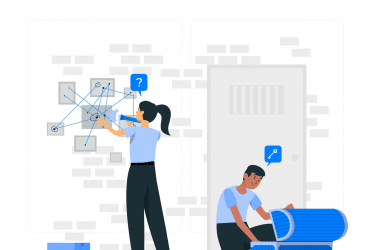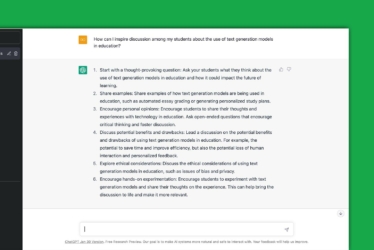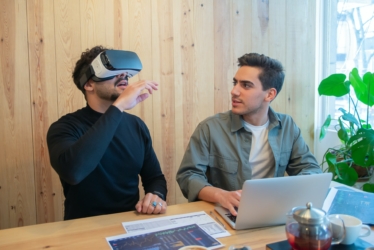Projects
Building links between NL’s faith communities and the wider society
Since the demand for topics that Leiden Islam Academy (LIA) focuses on far exceeds the resources offered through a traditional classroom, and bearing in mind the potential controversiality or sensitivity associated with Islam, LIA made the decision to collaborate with the Centre for Innovation at Leiden University in order to create learning experiences that utilise digital communication tools.
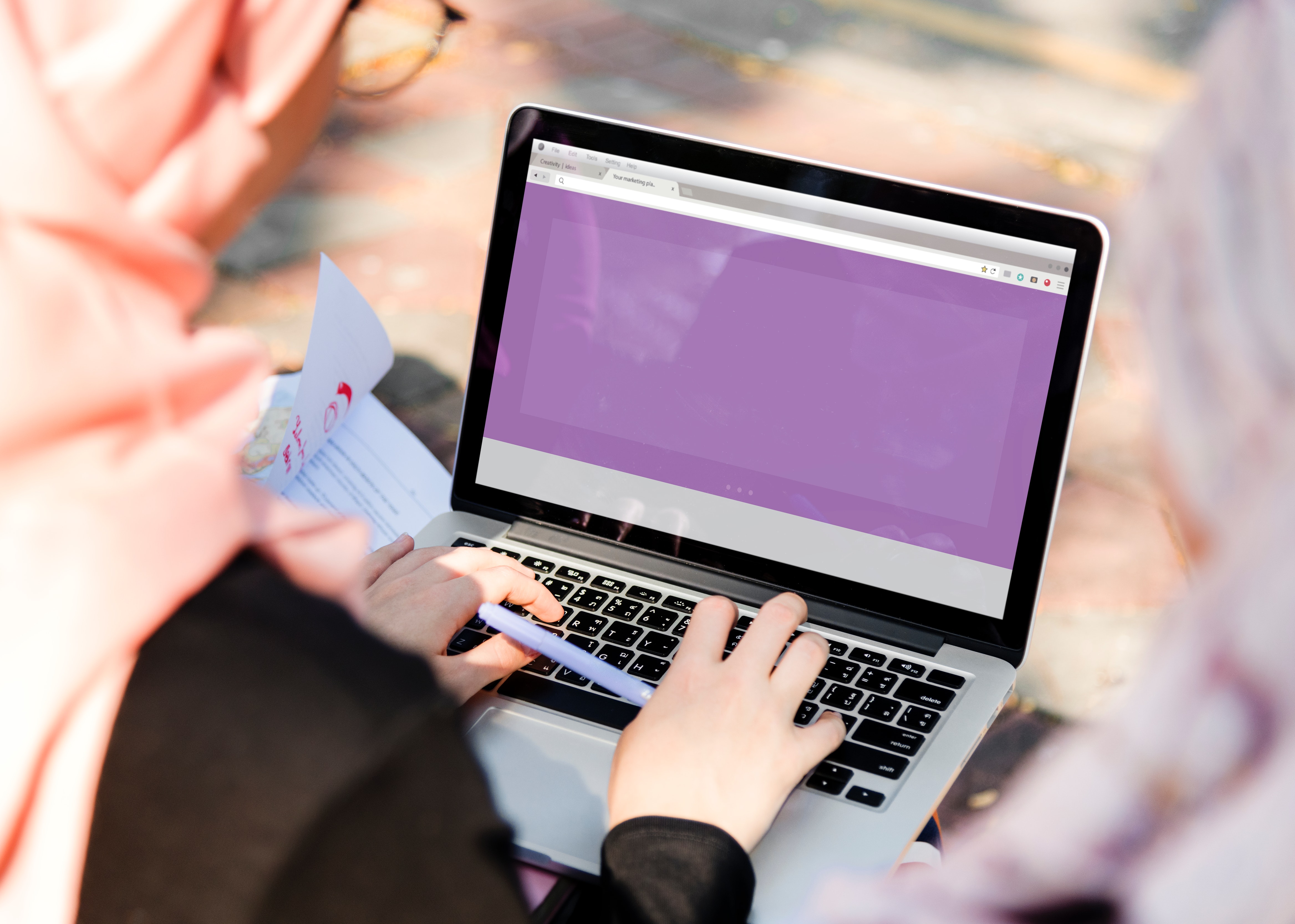
Islam in de Klas: An online course designed to foster empathy and debate
Though the search for an optimal learning method was challenging, the results the pilot run of the course indicated success. It achieved a platform whereby a safe and anonymous discussion led to expanding awareness and the participants reported feeling better-equipped to deal with future dilemmas that might arise in encounters between Muslims and non-Muslims in the setting of a Dutch primary school. A teacher who took the course said that: “All teachers should have such sensitivity and empathy training before embarking into their teaching careers. This is because such a course provides an opportunity for teachers to examine their own preconceptions and awareness.”
This is linked to the method of producing a digital course which places a conversation between persons as a starting point for the instructor towards the provision of information on Islam and Muslim societies.
“All teachers should have such sensitivity and empathy training before embarking into their teaching careers. This is because such a course provides an opportunity for teachers to examine their own preconceptions and awareness.”
Made for and together with teachers
Thus, Islam in de Class is designed to be taught through the examination of candid, previously-recorded video conversations between teachers.
Having been developed in collaboration with teachers seeking insight into the minds of their pupils, the course explores challenges that non-Muslim primary school teachers had had to resolve in their dealings with pupils from Muslim backgrounds. Such challenges included for example the pupils’ perception of and relationship with the privacy of their own bodies in school showers, related to differences in cultural attitudes and upbringing. Another example was pupils’ personal opinions on celebrating Christmas along with the rest of the students. Next to the teacher voices, the parents also provided their thoughts on a variety of topics via podcast discussions, the combination of the voices added to the course creates a very rich resource for participants taking the course.
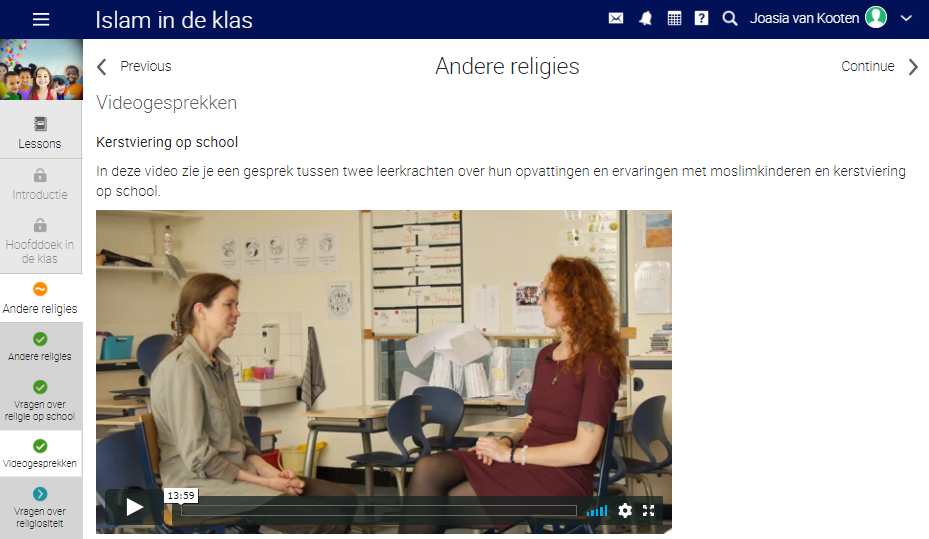
No “normative” solutions
Utilizing digital innovation, in this case in the form of videos and podcasts, enabled the placing of real experiences of real people at the centre of the discussion, rather than abstract information about the topic.
Fatiha confirms that: “this method enabled me to help the participants find their own solutions and answers to professional dilemmas instead of offering my own”. This was helpful to her as an instructor because as she explains further:“I did not feel pressured to provide normative answers that might have clashed with my own values. Rather, the discussion avoided providing easy, one-size-fits-all answers.” The objective of this course focuses on whether the participants feel better equipped to deal with future situations through increased awareness of the experiences of the other’s point of view. That way, individuals, including the teacher, on potentially opposite sides of an issue get to listen to the real-life stories and personal histories that have molded the opinions of one another.
“I did not feel pressured to provide normative answers that might have clashed with my own values. Rather, the discussion avoided providing easy, one-size-fits-all answers.”
About LIA’s mission to build links between faith communities in the Netherlands with the wider society, Fatiha Azzarhouni, vice-director and program coordinator at LIA, states that this initiative came together when Prof.dr. Maurits Berger, director, and she identified the need and demand for a fresh academic look at the position of Muslims as a minority in the Netherlands.
With that in mind, LIA aims not only to provide an academic forum for social topics regarding Muslims in Holland, but also a broader platform for academic endeavors about Islam itself.
More interactions amongst Muslims and non-Muslims across professional and social fields
Many of the courses offered by LIA target an audience that comprises of individuals and organizations whose interaction with Muslims is on the rise. As Fatiha explains: “with LIA we hope to engage with people from all walks of life who are interested in an academic discussion of Islam generally, and Muslims in Holland specifically, be they career-driven such as lawyers, teachers, doctors, and diplomats, or any individual and student from across the academic spectrum.”
“With LIA we hope to engage with people from all walks of life who are interested in an academic discussion of Islam generally, and Muslims in Holland specifically, be they career-driven such as lawyers, teachers, doctors, and diplomats, or any individual and student from across the academic spectrum.”
Furthermore, LIA aims to expand the study of the evolution of Islam itself. For example,one course focuses on the history of Islam in Europe. Though these courses may intrigue the interest of non-Muslims, the demand by Muslims themselves for such knowledge need not be understated.
Another example of a course relevant to the evolution of Islam in Europe is the study of the historic development of the position of an Imam as it occurred among practicing Muslims in the Netherlands.
A platform for everyone
LIA reiterates its mission to bring Muslims and non-Muslims in the same room – or digital platform – in order to compare experiences and points of view about relevant topics, including the ones deemed controversial. LIA believes in the value of dialogue between people, as opposed to groups of people reading about each other in the media or elsewhere. This way, LIA aims to include everyone in the academic exploration of an age-old, rich, and diversely colorful culture!


